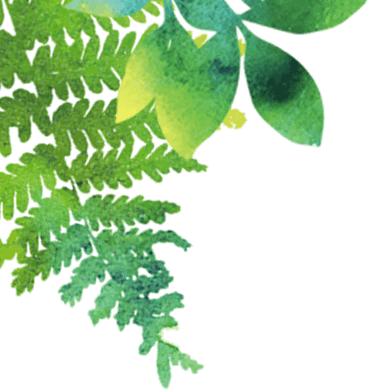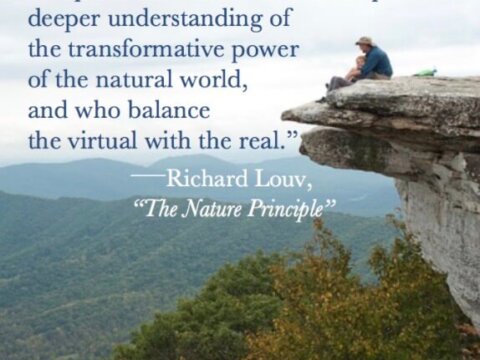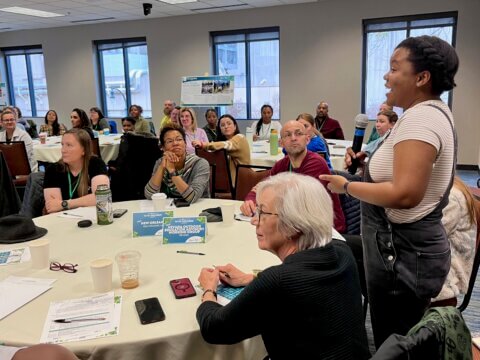Nature Calling

When Richard Louv asked me to write this essay, I wasn’t quite sure which voice to use and to whom I was to direct it. I had recently written a piece for psychotherapists inspired by the emergence of spring in the Blue Ridge Mountains of North Carolina, where my family and I had recently sought higher ground during the pandemic. My therapeutic voice encouraged mental health clinicians to help their clients temper the pandemic’s grim psychological impact with hope by looking for signs of Spring, and with them, hope – a budding tree, a warm rain, an industrious bird, a lazily awakening bear, last vestiges of snow, changing winds. That therapeutic voice came from a place deep within me, rooted in occasionally neglected hope and optimism clouded by everyday realities. I hoped my words would uplift therapists as they attempted in turn, to uplift their clients who were struggling to find silver linings, and to part the clouds of despair wrought by this most recent, and not likely last of nature’s viral furies.
As a therapist, but more so as a play therapist, I have always sought ways to bring the outdoors inside for my clients. Wherever my clinical practices were located, I would, as often as possible, break free from the confines of fluorescent lighting and plasterboard walls by taking clients for walks through the neighborhoods where invariably a tree, a shrub, a passing animal or the changing sky would become palettes upon which we could paint stories somehow related to their lives. My wall of miniature sandtray objects with which my clients could create their own symbolic worlds and work through challenges and conflicts, always contained rocks, twigs, shells, bark and any other natural object I could find. And not infrequently, I would offer photographic homework assignments to clients through which they could capture elements of their natural world that somehow anchored our therapeutic work.

As a (college) teacher, I often struggled to enliven classroom discussions, whose origins in glossy textbook pages left me feeling sensory deprived and restless. My campus was nestled in a pine tree hammock, visited all too infrequently by my young students who had no compunction spending hours (and very often our shared class time) staring into their phones. Needless to say, they were thrown quite off balance when unannounced, I would gather their devices and march them out of our classroom and down the air-conditioned hallways into the bright sunshine and warm breeze of South Florida. With simple instructions to journey outward and silently on separate paths, paying close attention to the sounds, sites and sensations of their immediate natural world, they reluctantly indulged me on what I called a sensory-perceptual walkabout (chapter 2 in our Introductory Psychology textbook). Upon return to the classroom, each recalled with a seemingly newfound appreciation for the intricate geometrical and tactile wonder of a pinecone, the sound and feel of pine needles beneath their feet, the wordlessness of a gentle breeze and the smell of a distant unfamiliar scent.
As a parent, I have tried not to impose my appreciation for nature on our children for fear it would lead to yet another “oh, there he goes trying to teach us something” rebuke. To add to the challenge of sneaking in a nature lesson or two, the summers in south Florida are not nearly as dramatic as they are in say, the mountains of North Carolina. But if one looks closely enough, the trees do indeed cycle, the temperature drops a few degrees on average in the “winter” months and the tropical and daily deluges subside. But it has been our trips to the mountains that have provided ready-made natural classrooms for our two reluctant outdoors children. So much so, that our son, who has historically struggled with inattention, impulsivity and distractibility has actually relocated to the mountains and has often be heard exclaiming his love of vistas, the change of seasons and the occasional bear or deer encounter. While recently on a nature walk with me, our grown daughter lagged behind, so much so that I doubled back to spot her taking a picture of a budding tree. I was astounded, yet deeply gratified that my love of nature had taken root and blossomed within her.
As a citizen of the (natural) world, I write this essay while cloistered at 5000 feet in an attempt to outrun the virus- to seek higher ground so to speak. But I am soon to return home. I will terribly miss the walks in the woods, the nighttime strolls, the sites, sounds and smells of the great outdoors, my attention veers to our impending return to south Florida. And to my mango tree. My beloved, yet very messy and increasingly unpredictable child who will soon reluctantly bring forth a new harvest. This lone citrus has been my seasonal timekeeper in a place where the changing seasons have been increasingly difficult to discern. Global warming, they say!
***
As I turned from this writing and these final days of winter’s grudging retreat, to stand one more time on my balcony overlooking the hills, a hummingbird flew into my apartment…and then out again, perhaps as a messenger, perhaps as a talisman, but most certainly as a reminder that nature will not be contained, nor will my love for it and need to raise my varied voices of appreciation and awe to anyone who will listen.
Lawrence ‘Larry’ Rubin, PhD, LMHC, ABPP is a Florida-based psychologist, mental health counselor and registered play therapist-supervisor, who directs the Mental Health Counseling program at St. Thomas University and is on the clinical faculty of Capella University. He specializes in the assessment and treatment of children, teens and their families. Larry is an editor of Psychotherapy.
-
Voices
CAMPING WHILE PARENTING: A Mother-Son Adventure
-
Feature
A common thread: Indigenous-led foundation weaves together activism and art, climate and community
-
Network News
Community Spotlight: Prescribe Outside
-
Voices
That’s nice, mija: Finding common language in nature connections
-
Richard Louv
"HUMMINGBIRD PARENTS": Seven Actions Parents Can Take To Reduce Risk And Still Get Their Kids Outside




